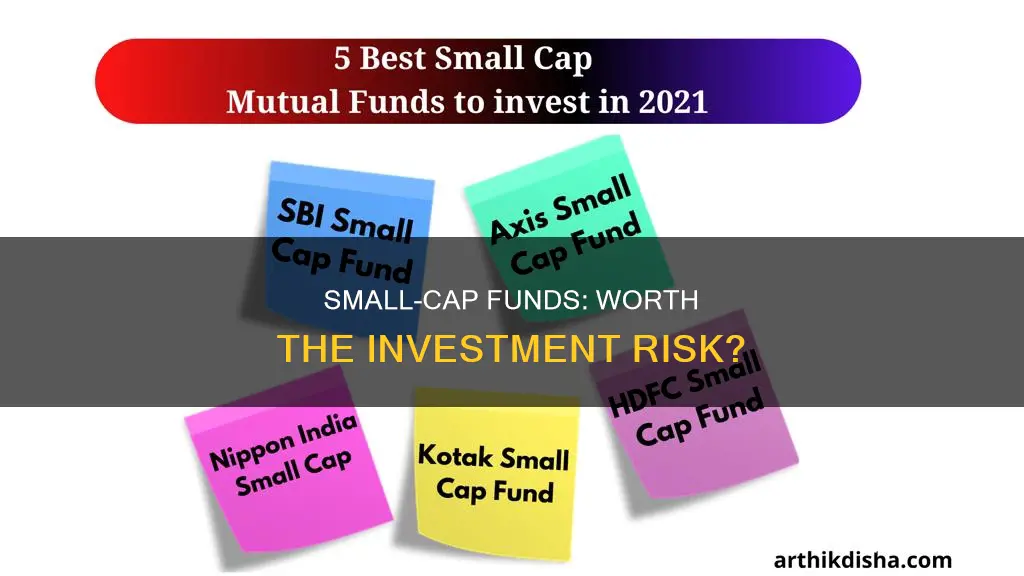
Small-cap funds are a popular investment option due to their high returns. They are equity mutual funds that invest in small-cap stocks, or companies with a market capitalization of less than $2 billion. These companies are typically in the early stages of their business growth and have a lot of scope for expansion, making them attractive to investors. However, small-cap funds are highly sensitive to market movements and are therefore considered risky investments. They are best suited for investors with a high-risk appetite and a long-term investment horizon.
| Characteristics | Values |
|---|---|
| Market Capitalization | $250 million to $2 billion |
| Volatility | High |
| Risk | High |
| Returns | High |
| Growth Potential | High |
| Investment Horizon | Long-term |
| Investment Portfolio | Small portion |
| Taxation | Capital gains tax, Dividend Distribution Tax |
What You'll Learn

High returns and high risk
Small-cap funds are a popular investment option due to their high returns. They are equity mutual funds that invest in small-cap stocks, or companies with a market capitalization of between $250 million and $2 billion. Small-cap companies are generally young, growing companies with a lot of scope for growth, and therefore, small-cap funds have a lot of growth potential.
However, small-cap funds are highly sensitive to market movements and are therefore very risky. They are the most volatile among all equity funds and are prone to wild swings. They are also more likely to lose value during a recession, as they have fewer financial resources and are less financially robust. They are also riskier since they are generally unproven companies. For these reasons, small-cap funds are more suitable for investors with a high-risk tolerance and a long investment horizon.
Small-cap funds have historically outperformed large-cap funds, but this is not always the case. In recent years, large-cap stocks have outperformed small-cap stocks. Therefore, it is important to balance your portfolio with both small-cap and large-cap funds, as well as mid-cap funds. This will help to reduce risk and maximize returns.
Overall, small-cap funds can provide high returns but come with high risk. They are a good option for investors who are willing to take on more risk and have a long time horizon. However, it is important to carefully consider all the factors that influence the performance of these funds before investing.
Launching Your First Investment Fund: A Beginner's Guide
You may want to see also

Long-term investment goals
Small-cap stocks are a good investment option for long-term investment goals. They have historically outperformed large-cap stocks, and this is often referred to as the "small-cap effect". Small-cap stocks are considered to be economically sensitive, rallying in recoveries and lagging when the economy is heading into recessions.
Small-cap stocks have more growth potential than large-cap stocks, which means investors may see better returns. However, small-cap stocks are also more volatile and riskier than large-cap stocks. They are generally younger companies that are growing fast, and they have a greater chance of increasing their share prices.
Small-cap stocks are best suited for investors who are willing to accept more risk in exchange for higher potential gains. If you are a new investor, it is recommended to start with other categories of mutual funds before exploring small-cap funds.
Additionally, small-cap mutual funds perform well over a long period of time. For this reason, investors should remain invested for at least 5-6 years.
Strategies for Investing in Soros Fund Management
You may want to see also

Taxation and expense ratio
When considering investing in small-cap funds, it is important to understand the taxation and expense ratios involved.
Taxation
Small-cap funds are a type of equity fund that primarily invests in small companies with a market capitalisation below a certain threshold (for example, in India, this threshold is Rs. 5,000 crores). These companies are typically beyond the top 250 companies in the market and are relatively unknown. Due to their small size, these companies offer high growth potential but also carry a high degree of volatility.
When investing in small-cap funds, it is crucial to consider the holding period, which refers to the duration an investor stays invested. Capital gains earned from redeeming small-cap fund units are taxed based on the holding period. If the holding period is up to one year, the capital gains are considered short-term and are typically taxed at a higher rate. On the other hand, if the holding period is more than one year, the capital gains are classified as long-term, and in many jurisdictions, long-term capital gains above a certain threshold are taxed at a lower rate or are exempt from taxation.
Expense Ratio
The expense ratio is a crucial factor to consider when investing in small-cap funds. It represents the fees and operating costs associated with managing an investment fund. The expense ratio is calculated by dividing the fund's operating expenses by the average total value of its assets. A reasonable expense ratio for an actively managed fund is generally considered to be around 0.5% to 0.75%, while a ratio above 1.5% is typically deemed high. In contrast, passive funds, which aim to replicate the performance of a specific market index, have lower expense ratios, with an average of about 0.12%.
Small-cap funds tend to have higher expense ratios compared to large-cap funds due to the additional analysis and research required to identify and invest in small-cap stocks. Actively managed small-cap funds will have higher expense ratios than passively managed funds, as they involve more frequent buying and selling of securities and require a team of analysts.
When evaluating small-cap funds, it is essential to consider the impact of the expense ratio on investment returns. Higher expense ratios can significantly reduce an investor's profits over time. Therefore, investors should carefully compare the expense ratios of different funds and consider the potential impact on their overall investment returns.
In conclusion, when considering investing in small-cap funds, it is crucial to understand the taxation rules based on the holding period and to carefully evaluate the expense ratios of different funds to make an informed decision.
Bond Funds vs Individual Bonds: Pros and Cons for Investors
You may want to see also

Diversification
Diversifying your investment portfolio by including small-cap funds can be advantageous. Small-cap funds invest in companies that are typically in the early stages of their business lifecycle and have significant growth potential. As these companies expand, the value of their stock prices increases, boosting your investment returns. The small-cap investment universe is also more extensive than the large and mid-cap spaces, offering a broader range of opportunities.
Risk Mitigation
Small-cap funds can help minimise overall portfolio risk. By allocating a portion of your portfolio to small-cap funds, you can gain exposure to various sectors and business types. This diversification reduces the impact of any single investment or sector on your overall returns. It's important to note that small-cap funds themselves are highly sensitive to market movements and can be volatile, so diversification is crucial to balancing this risk.
Institutional Ignorance
Small-cap stocks are often overlooked by large institutional investors, creating room for organic growth. The lack of attention from analysts and institutions can lead to undervalued stocks in the market. This situation allows fund managers to benefit from investing in hidden gems that may have been undervalued by the broader market.
Long-Term Investment Horizon
Small-cap funds are generally recommended for investors with a long-term investment horizon. These funds are suitable for those with a time frame of at least seven to ten years. This longer-term perspective allows for riding out market volatility and giving small companies the time needed to grow.
Portfolio Allocation
When considering diversification, it's important to allocate an appropriate portion of your portfolio to small-cap funds. While they offer attractive growth potential, they also carry higher risks. It is generally advised to dedicate a small portion of your portfolio to small-cap funds, typically around 5-8%. This allocation ensures that you can benefit from the upside potential while managing the impact of any downturns.
Fund Manager Track Record
When investing in small-cap funds, it's crucial to consider the fund manager's track record. Small-cap equity funds have highly divergent performance, and the fund manager's ability to spot the right stocks ahead of the market is critical. Monitoring the fund manager's performance and making adjustments if needed can help optimise your returns.
Mutual Funds in India: Steps to Invest Directly
You may want to see also

Volatility and growth
Small-cap funds are generally considered to be riskier and more volatile than large-cap funds. This is because small-cap companies tend to be in the early stages of their life cycle and are more vulnerable to market downturns. They have fewer financial resources, less business strength, and are more likely to have negative cash flows.
However, small-cap funds also have greater growth potential. Small-cap stocks have historically outperformed large-cap stocks, and small-cap companies have more room to grow than larger, more established companies.
Because of this volatility, small-cap funds are generally considered a riskier investment in the short to medium term. However, over longer periods, they can offer larger returns. For this reason, small-cap funds are often recommended for investors with a higher risk tolerance and a long investment horizon.
To balance out the risk, it is generally recommended that investors allocate a small portion of their portfolio to small-cap funds.
Smart Strategies for Choosing the Right Mutual Fund
You may want to see also
Frequently asked questions
Small-cap funds primarily invest in small-cap companies, which are those with a market capitalization of around $250 million to $2 billion. Small-cap funds are considered riskier than other funds as they are highly sensitive to market movements, but they also offer the potential for high returns.
Small-cap funds offer the potential for high returns, with some companies growing 100 times or more above their original value. They also provide an opportunity for diversification and have a lower Net Asset Value (NAV), allowing investors to buy more units.
The main risk of investing in small-cap funds is their high volatility. Small-cap stocks tend to be more volatile than large-cap stocks, and even slight market changes can significantly impact their share prices.
Small-cap funds are suitable for investors with a high-risk tolerance and a long investment horizon. These funds are not suitable for short-term investments as small companies need time to grow.
Small-cap funds tend to be more volatile and carry more risk than large-cap funds, but they also offer higher potential returns. Large-cap funds, on the other hand, provide more stability and are considered safer investments.







